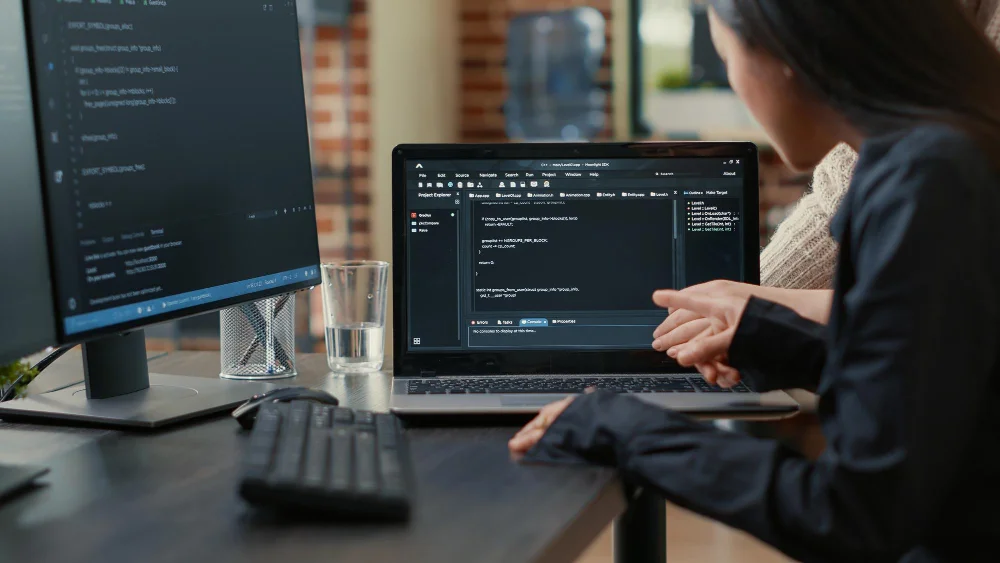Laravel is a powerful and popular PHP framework known for its elegant syntax, expressive codebase, and robust features that streamline the web development process. Developed by Taylor Otwell, Laravel has become the framework of choice for developers worldwide due to its simplicity, scalability, and extensive ecosystem of tools and libraries.
When considering the development of a Laravel web application, one of the most pressing questions is, “How much will it cost?” Laravel, being a widely popular PHP framework, is known for its flexibility, robust architecture, and ability to create feature-rich applications. However, the cost of building a Laravel web application can vary significantly based on several factors, including the complexity of the project, the features required, and the development team’s expertise.
Laravel’s open-source nature makes it a cost-effective choice compared to proprietary solutions. It offers pre-built modules, a vast ecosystem of tools, and seamless integration capabilities, reducing development time and, consequently, costs. However, building a web application isn’t just about coding—it involves planning, design, testing, and deployment, all of which contribute to the final cost.
For startups, a basic Laravel application may suffice, while enterprises may require more complex systems with advanced features, multi-user support, and robust security measures. Each of these factors can impact the overall investment. Working with a skilled team that understands your goals is essential to ensure the application is not only cost-efficient but also aligns with your business needs.
As a leading web development company in USA, Cenozic use Laravel for building web applications and APIs, which offers numerous advantages such as rapid development, scalability, security, and a vibrant community. By leveraging Laravel’s features and ecosystem, businesses can build robust and feature-rich web applications and APIs that meet their needs and drive business success.
What is Laravel?
Laravel is a powerful, open-source PHP framework designed for web application development. Created by Taylor Otwell in 2011, Laravel simplifies the process of building robust and scalable web applications by providing developers with elegant syntax, pre-built tools, and a well-organized structure. Its modular design, extensive library of features, and active community support have made it one of the most popular frameworks in the web development landscape.
Laravel is built on the Model-View-Controller (MVC) architecture, which ensures a clean separation of business logic and presentation layers. This approach makes applications more maintainable, scalable, and efficient. It offers developers an array of features, including routing, authentication, caching, and database management, which streamline the development process and reduce repetitive tasks. It offers a wide range of features and functionalities, including:
- Eloquent ORM: Laravel’s built-in ORM (Object-Relational Mapping) allows developers to interact with databases using intuitive and expressive syntax, making database management effortless.
- Blade Templating Engine: Blade is Laravel’s powerful templating engine that simplifies the process of creating views and layouts, enabling developers to write clean and concise HTML code with ease.
- Routing: Laravel provides a simple and intuitive routing system that allows developers to define application routes using expressive and readable syntax, making it easy to create SEO-friendly URLs and manage complex routing requirements.
- Authentication and Authorization: Laravel offers built-in authentication and authorization features, including user registration, login, password reset, and role-based access control, which can be easily integrated into web applications.
- Middleware: Laravel’s middleware feature allows developers to filter HTTP requests entering the application, enabling tasks such as authentication, logging, and CSRF protection to be handled centrally and efficiently.
- Artisan CLI: Laravel includes a powerful command-line interface called Artisan, which provides developers with a set of built-in commands for automating common tasks, such as database migrations, seeding, and generating boilerplate code.
Advantages of Laravel
Laravel has established itself as one of the most powerful and versatile PHP frameworks available, offering numerous advantages for developers and businesses alike. Its feature-rich ecosystem, ease of use, and focus on best practices make it a top choice for building modern web applications. Laravel’s advantages make it a go-to framework for building modern, secure, and scalable web applications that meet diverse business requirements. Its robust ecosystem, combined with strong community support and powerful features, ensures that developers can create outstanding applications with minimal hassle.
Laravel stands out as one of the most powerful PHP frameworks, offering an extensive range of features that simplify development while ensuring high performance, security, and scalability. Here’s a detailed look at its advantages:
1. MVC Architecture for Clean Code
Laravel uses the Model-View-Controller (MVC) architecture, which organizes your application’s logic, user interface, and data separately. This separation promotes cleaner code, easier debugging, and better collaboration between front-end and back-end developers. It ensures that even large-scale applications are maintainable and scalable over time.
2. Built-In Authentication and Authorization
One of Laravel’s standout features is its pre-configured authentication system, which allows developers to implement login, registration, password resets, and access control seamlessly. The framework also provides tools for defining user roles and permissions, enabling granular access control for different parts of the application.
3. Eloquent ORM for Simplified Database Management
Laravel’s Eloquent ORM is a powerful tool for database management. It allows developers to interact with databases using an intuitive syntax rather than raw SQL queries. Eloquent also supports relationships between tables, making it easier to retrieve and manipulate related data efficiently.
4. Blade Templating Engine
The Blade templating engine is a lightweight and fast tool that enables developers to create dynamic web pages. It includes features like template inheritance, conditional statements, and loops, simplifying the process of building reusable and maintainable layouts without sacrificing application speed.
5. Robust Security Features
Laravel provides multiple security mechanisms to protect applications against vulnerabilities such as:
- SQL Injection: By using prepared statements and query binding.
- Cross-Site Request Forgery (CSRF): With built-in CSRF tokens for form submissions.
- Password Encryption: Through the use of hashing algorithms like bcrypt.
These features ensure a secure environment for both developers and end-users.
6. Modular and Scalable Design
Laravel’s modular structure allows developers to add or modify components without affecting the entire application. This scalability is ideal for growing businesses, as new features or modules can be integrated seamlessly while maintaining performance and stability.
7. Task Scheduling and Automation
With Laravel’s scheduler, developers can automate routine tasks like sending emails, clearing caches, or running reports. This not only reduces manual intervention but also ensures that tasks are executed reliably and on time.
8. Testing and Debugging Tools
Laravel is built with testing in mind. It comes integrated with PHPUnit, enabling developers to write and run unit tests for different parts of the application. Additionally, its debugging tools make identifying and resolving issues faster, improving overall code quality.
9. Rich Ecosystem and Developer Tools
The Laravel ecosystem is one of its biggest strengths. It includes tools such as:
- Laravel Forge: For server provisioning and deployment.
- Laravel Nova: For building admin dashboards.
- Laravel Envoyer: For zero-downtime deployments.
These tools help developers streamline various aspects of the development lifecycle, from coding to deployment and monitoring.
10. Strong Community Support
Laravel has a vibrant global community that provides access to a wealth of tutorials, forums, and open-source packages. This support network ensures that developers can find solutions to challenges and stay updated on the latest trends and best practices.
Cost of Laravel Web Development:
The cost of a Laravel web application development or API can vary depending on several factors, including the complexity of the project, the scope of features, the level of customization required, and the expertise of the development team. We can provide a general overview of the cost considerations involved in building a Laravel web application:
- Scope of Features: The cost of a Laravel web application will also depend on the features and functionalities you want to include. Basic web applications with standard features like user authentication, CRUD operations, and basic user interfaces will cost less than more complex applications with advanced features such as real-time updates, payment gateways, integrations with third-party APIs, and more.
- Development Time: The primary factor influencing the cost of building a Laravel web application is the amount of time required for development. The more complex and feature-rich the application, the more development time it will require. Developers typically charge by the hour or project, so the longer it takes to develop the application, the higher the cost will be.
- Design Requirements: The complexity and intricacy of the design can impact the cost of development. Custom designs, unique layouts, and intricate user interfaces may require more time and effort to implement, resulting in higher development costs. Pre-designed templates or simpler designs may be more cost-effective.
- Customization Needs: If you require extensive customization or integration of third-party services, the cost of development may increase. Customization could include integrating specific functionalities, modifying existing features, or developing custom modules to meet your unique requirements.
- Development Team Rates: The rates charged by developers or development teams can vary based on factors such as their level of experience, expertise in Laravel development, geographical location, and the reputation of the development agency. Higher rates may indicate more experienced developers or agencies, but they can also increase the overall cost of development.
- Additional Costs: There may be additional costs associated with building a Laravel web application, such as hosting fees, domain registration, SSL certificates, licensing fees for third-party software or plugins, and ongoing maintenance and support costs.
To provide a specific cost estimate for building a Laravel web application, it’s essential to define the project requirements, including the desired features, design, and functionality. You can then consult with Laravel developers or development agencies to get quotes based on your project specifications. Keep in mind that it’s crucial to balance cost considerations with the quality and value of the final product to ensure a successful and cost-effective development process.
Cost of Laravel Development in the USA
The cost of Laravel website development in the USA can vary widely depending on several factors, including the complexity of the website, the scope of features, design requirements, customization needs, and the rates of developers or development teams. However, we can provide a general overview of the cost considerations involved in Laravel website development in the USA:
- Basic Website Development: For a simple Laravel website with standard features such as user authentication, CRUD operations (Create, Read, Update, Delete), and basic user interfaces, you can expect to pay anywhere from $5,000 to $15,000. This cost estimate would typically include template-based design, basic functionality, and limited customization.
- Mid-Range Website Development: For a mid-range Laravel website with moderate complexity and additional features such as integration with third-party APIs, payment gateways, CMS development, and more advanced user interfaces, the cost may range from $15,000 to $50,000. This estimate would include custom design, enhanced functionality, and moderate customization.
- High-End Website Development: For a high-end Laravel website with extensive customization, complex functionalities, advanced features such as real-time updates, custom integrations, e-commerce capabilities, and intricate design requirements, the cost could exceed $50,000 and go up to several hundred thousand dollars or more. This estimate would include custom development, sophisticated design, and extensive customization to meet specific business needs.
- Hourly Rates: Laravel developers in the USA typically charge hourly rates ranging from $50 to $200 or more, depending on their level of experience, expertise, and geographical location. Senior developers or development agencies with a strong reputation may charge higher rates than junior developers or freelancers.
- Additional Costs: In addition to development costs, there may be additional expenses associated with Laravel website development, such as hosting fees, domain registration, SSL certificates, licensing fees for third-party software or plugins, ongoing maintenance and support costs, and any other miscellaneous expenses.
It’s important to note that these cost estimates are general guidelines, and the actual cost of Laravel website development in the USA or India can vary based on the specific requirements of your project, the complexity of the website, the expertise of the development team, and other factors. To get an accurate cost estimate for your Laravel website development project, it’s recommended to consult with Laravel developers or development agencies and discuss your project requirements in detail.
In conclusion, Laravel is a powerful and versatile framework for building web applications and APIs, offering numerous advantages such as rapid development, scalability, security, and a vibrant community. The cost of Laravel web and API development depends on various factors, and it’s essential to consider the project’s requirements and budget carefully when estimating costs.
How Cenozic Can Help You in Laravel Web Development
At Cenozic, we harness the power of Laravel, one of the most popular PHP frameworks, to deliver modern, scalable, and secure web solutions tailored to your business needs. Our expertise in Laravel enables us to provide a wide range of services, ensuring your application is built with efficiency, functionality, and long-term scalability in mind.
Custom Web Application Development
We specialize in creating custom web applications that cater to your unique business requirements. From startups to large enterprises, our Laravel solutions are designed to deliver exceptional performance and a seamless user experience.
Laravel eCommerce Solutions
For businesses looking to establish or enhance their online presence, we provide feature-rich eCommerce development services using Laravel. Our solutions are optimized for performance, secure payment integrations, user-friendly designs, and scalability, ensuring a robust online shopping experience.
API Development and Integration
Cenozic offers expertise in developing and integrating APIs with Laravel. Whether you need to connect with third-party services or build a custom API for your application, our team ensures secure and efficient integration, enabling seamless data exchange across platforms.
Migration and Upgradation Services
Stay ahead of the curve with our Laravel migration and upgradation services. We help you move your existing application to Laravel or upgrade to the latest Laravel version, ensuring enhanced functionality, performance, and security.
Maintenance and Support
Our relationship doesn’t end with deployment. Cenozic provides ongoing maintenance and support to ensure your Laravel application remains updated, secure, and optimized for performance.
At Cenozic, we harness the power of Laravel, one of the most popular PHP frameworks, to deliver modern, scalable, and secure web solutions tailored to your business needs. Our expertise in Laravel enables us to provide a wide range of services, ensuring your application is built with efficiency, functionality, and long-term scalability in mind. We don’t just build applications; we build partnerships. Our Laravel web development services are designed to empower your business with innovative, user-centric, and scalable solutions that drive growth and success.
Whether you’re building an innovative startup product or transforming your enterprise application, launching a new project or upgrading an existing platform Cenozic’s Laravel development services provide the foundation for success. Let us help you create a cutting-edge solution that empowers your business to thrive in today’s competitive landscape.


 The Future of AI: How Machine Learning is Transforming Businesses
The Future of AI: How Machine Learning is Transforming Businesses  AI in E-commerce: Enhancing Customer Experience & Engagement
AI in E-commerce: Enhancing Customer Experience & Engagement  How AI-Powered Chatbots Are Revolutionizing Customer Support
How AI-Powered Chatbots Are Revolutionizing Customer Support  The Role of AI in Mobile App Development: Smarter and Faster Apps
The Role of AI in Mobile App Development: Smarter and Faster Apps  How To Choose Top Website Development Company In USA
How To Choose Top Website Development Company In USA 

